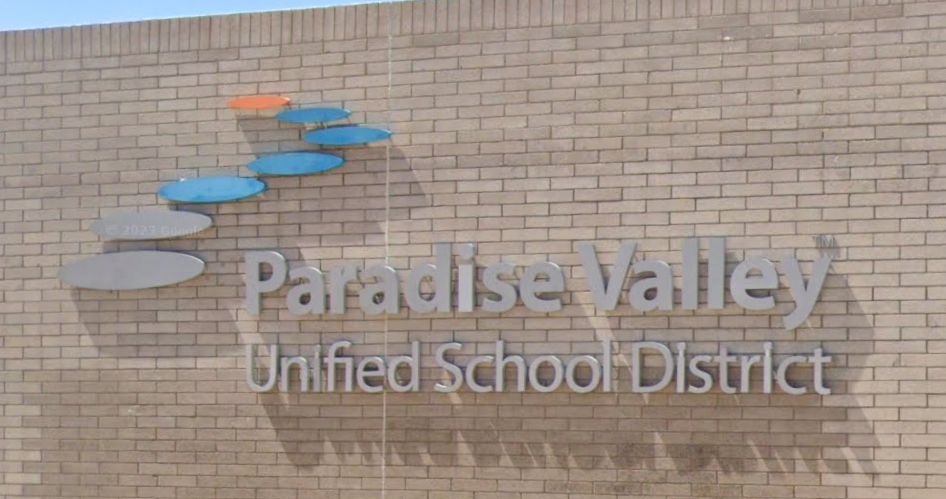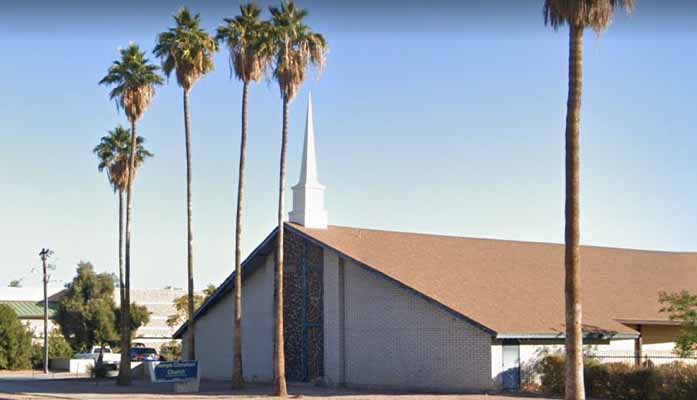
by Corinne Murdock | Nov 7, 2023 | Education, News
By Corinne Murdock |
A Paradise Valley Unified School District (PVUSD) board member is criticizing district leadership for withholding the truth about an allegedly predatory teacher from parents and the community.
The Phoenix Police Department is investigating the late Keiko Yoshimine, a Paradise Valley High School chemistry teacher and Horizon High School basketball coach, on allegations of inappropriate conduct with a female high school student. Yoshimine allegedly committed suicide last month, a day after she had admitted to inappropriate behavior during police questioning; no arrest was made.
In a press release, PVUSD Governing Board Member Sandra Christensen pointed out that PVUSD has implemented other mental and behavioral health supports — such as the Multi-Tiered Systems of Support (MTSS), Whole Child initiatives, and partnerships with behavioral health clinics — yet declined to bring attention to an immediate alleged danger to children.
“It is ironic how the district seems so concerned with mental health that we focus more on emotional well-being than academics; however, when an actual crisis occurs, it gets swept under the rug. […] I have to question the motives of district leadership and whether expressions of concern for the safety and well-being of all our students are more than just lip service,” said Christensen. “At what point did the district start caring more about the image of the administration rather than the safety of our children? […] Hiding egregious violations or allegations of crimes, including child endangerment, should never be tolerated.”
Christensen revealed that she had urged PVUSD leadership, including Superintendent Troy Bales and Governing Board President Nancy Case, to advise the district community about the investigation into Yoshimine, since the district’s letter advising the community of Yoshimine’s death omitted the allegations of sexual misconduct against her. Christensen also recommended that district leadership notify parents of students in Yoshimine’s class and on Yoshimine’s sports teams of the allegations against their teacher and coach.
Bales turned down Christensen’s advice. Bales informed Christensen that the district’s legal counsel had advised them to not inform the public about the Yoshimine investigation until given direction to do so by law enforcement.
“At this time and advised by legal counsel, the District will continue to take direction from Phoenix PD regarding expanding inquiry to other students,” stated Bales.
According to Christensen, Bales had informed her on the day police questioned Yoshimine that Yoshimine’s fingerprint clearance card would be suspended should she be arrested.
Christensen reported that it was only after social media publicization of the investigation into Yoshimine preempting her untimely death that PVUSD leadership offered the parents and community members more information about the police investigation.
“In the case of Ms. Yoshimine, I am deeply saddened that our students and families were not told the truth in a timely manner,” said Christensen.
As AZ Free News reported previously, there have been over 50 Arizona educators (along with over 20 certified in Arizona) accused of sexual misconduct with minors this year. Yoshimine was not named among those educators, nor are there any mentions of her in past Arizona State Board of Education meeting files.
The public is urged to come forward with any information of sexual misconduct or harm to a PVUSD student in the Yoshimine case, or in any other case. Please file a report with the Phoenix or Scottsdale police and PVUSD.
Corinne Murdock is a reporter for AZ Free News. Follow her latest on Twitter, or email tips to corinne@azfreenews.com.

by Daniel Stefanski | Nov 7, 2023 | News
By Daniel Stefanksi |
A recent report shows that elderly Americans are collectively losing billions of dollars through nefarious means.
Earlier this year, AARP released a report, showing that Americans over the age of 60 years old lose $28.3 billion each year to ‘elder financial exploitation’ (EFE).
According to the non-profit, EFE is “the illegal or improper use of an older adult’s funds, property, or assets.”
“While strangers often rely on quick and irreversible transactions such as gift cards or wire transfers, perpetrators who know the victim are more likely to gain direct access to their victims’ bank accounts. But financial exploitation of any kind wreaks havoc on the lives of older adults and their families,” said Jilenne Gunther, National Director of AARP’s BankSafe Initiative and lead author of the report. “The keys to stopping this growing problem are consumer education, frontline employee training and strengthened technology to flag suspicious activity.”
AARP labeled its methodology for producing the total annual losses as “a first-of-its-kind,” due to the fact that the majority of these dollars go unreported. In fact, the report estimated that out of the $28.3 billion comprising the annual EFE deficit, $20.5 billion is unreported. Almost three-quarters of the $28.3 billion ($20.3 billion) stems from people the victim(s) know, while the remaining $8 billion is pilfered from strangers.
In its conclusion, AARP asserts that the reason for this vast divide between the fraud from strangers or family / friends is because “the nature of stranger-perpetrated fraud bears little resemblance to fraud initiated by people the victim knows. To start, while strangers may rely on quick and irreversible transactions such as gift cards or wire transfers, perpetrators familiar to the victim are more likely to make incremental inroads, gaining direct access to funds, for example, by attaining joint ownership or power of attorney status on their victims’ accounts.”
The report gave two possible solutions to help minimize future EFE. The first is to “provide funding to states to mandate and standardize data collection procedures of Adult Protective Services, which would enhance the picture of EFE.” The second is to “tailor evidence-based intervention strategies based on perpetrator type.”
Daniel Stefanski is a reporter for AZ Free News. You can send him news tips using this link.

by Corinne Murdock | Nov 6, 2023 | News
By Corinne Murdock |
The state’s two main foster care court advocacy groups are requesting more volunteers to assist and advocate for children in the foster care system.
In a press release issued on Wednesday — also recognized as National Adoption Day — the Court Appointed Special Advocate (CASA) expressed a need for volunteers in all 15 counties to serve with them or the Foster Care Review Board (FCRB).
CASA and the FCRB provide aid to the approximately 10,000 children in the state’s foster care system. CASA Program Manager Charlie Gray stressed in a press release that expertise isn’t necessary for volunteering — just compassion.
“You do not need to be steeped in child welfare experience or knowledge,” said Gray. “You only need to have a compassion to help guide a child through one of the most emotionally difficult experiences they will have in their life.”
Children in the state’s foster system need the support and care of their community more than ever: as we reported in August, a recent audit of the Arizona Department of Child Services found that caseworkers were failing the children in their charge by neglecting to provide all necessary documents for their cases and skipping case review meetings.
The auditor general found that these shortcomings by DCS caseworkers not only hindered children’s cases but compromised the foster care system by diminishing trust from the Administrative Office of the Courts and the local foster care review boards tasked with completing foster children’s cases.
Arizona community members may make up for DCS shortcomings by providing advocacy, support, and attentive care to the children and their cases.
CASA volunteers visit and build a relationship with a child as well as the people involved in their case. These volunteers also serve as advocates for the child’s best interests in court by issuing recommendations, while working alongside others involved with that child. That may include the child’s teachers, foster family, parents, and service providers. These volunteers serve as a stable, consistent presence for the child.
“A CASA volunteer stays with the child throughout the entire case and is often the one consistent adult throughout the court process,” stated CASA.
Comparatively, FCRB volunteers serve on a five-member panel that meets virtually once a month to review children’s foster care cases. The goal of the volunteers is to become acquainted with the same cases, recognize the needs of a child and their family, and achieve permanency.
Those interested in volunteering must be at least 21 years of age, able to pass a fingerprint background check, and able to participate in an introductory program training. Those desiring to be CASA volunteers may apply here; those interested in applying to be FCRB volunteers may apply here.
There are plenty of other volunteer opportunities to assist the court system, and thereby make it easier for those going through it. CASA shared that the Arizona Supreme Court also needs volunteers for its 30 standing committees and commissions.
Corinne Murdock is a reporter for AZ Free News. Follow her latest on Twitter, or email tips to corinne@azfreenews.com.

by Daniel Stefanski | Nov 6, 2023 | News
By Daniel Stefanski |
A coalition of Arizona’s Corporation Commissioners have reached out to the state’s governor over concerns of rising prices for a subset of constituents.
Last month, four state commissioners wrote a letter to Governor Katie Hobbs to ask her to address the overwhelming price increases for electricity customers of the San Carlos Irrigation Project (SCIP). The signatories to the letter were Kevin Thompson, Lea Marquez Peterson, Nick Myers, and Jim O’Connor – all Republicans. Commissioner Anna Tovar, the lone Democrat on the panel, did not add her name to the letter.
The commissioners asserted that the change in costs was “purportedly related to the U.S. Department of Interior Bureau of Indian Affairs’ application of new purchased Power Cost Adjustment agreements which soared to $0.056 per kilowatt hour,” adding that “neither the Arizona Corporation Commission nor the State of Arizona has any regulatory authority over SCIP.” These added costs – on top of the customers’ electric power rates – has more than doubled the payments for many within this jurisdiction.
The lack of state jurisdiction in this matter means that the federal government would need to come to the table to resolve the crisis at hand – something that the commissioners asked Hobbs to facilitate. According to the commissioners, former Congressman Jim Kolbe had attempted to take care of this issue in the early nineties, when he introduced the San Carlos Indian Irrigation Project Divestiture Act to “complete divestiture and free SCIP customers from federal authorities.” Though this legislation passed the U.S. House and Senate and was signed into law by then-President George H.W. Bush, the policies apparently “never manifested into reality,” leading to this current unraveling of financial security and stability for these ratepayers.
In an exclusive statement to AZ Free News, Commissioner Kevin Thompson, who led the letter to the governor, said, “SCIP ratepayers are facing a terrible situation that is going to require officials at every level of government to work together like adults and find a solution for Arizonans that have been abandoned by the federal government.”
Thompson added, “Access to affordable electricity in a state like Arizona is a matter of life or death for too many and shouldn’t be a partisan issue. While the Commission has no authority over SCIP, I feel it is important to urge our leaders to explore meaningful solutions and act. These four Commissioners are willing to do whatever we can in our individual capacities to encourage our delegation and state government to put aside partisanship and get the federal government out of the business that private enterprise should be providing.”
The commissioners, in their communication to Hobbs, shared several potential solutions to the matter, which include exploring “divestiture of SCIP with the end goal of transferring generation, transmission, and customer responsibility to regulated Arizona utilities,” requesting “federal funds to provide necessary maintenance and improvements to the SCIP grid,” and researching “financial protections that can be provided to SCIP customers to increase the safety net and protect vulnerable ratepayers.”
They ended their letter with a plea for the governor and her team to do everything in their delegated authority to assist the afflicted Arizonans, saying, “It should be acknowledged that we recognize the vast majority of potential long-term solutions are outside of your control and authority as governor. However, like us, we know you are looking for meaningful solutions, and we would appreciate your willingness to advocate for Arizona ratepayers.”
This situation affecting SCIP customers has also attracted the attention of Senate Pro Tempore T.J. Shope, who issued a press release on October 23 to announce his “extreme frustration” with Hobbs’ “lack of care, concern, and action with skyrocketing power bills detrimentally impacting residents living in the SCIP.” Shope was less diplomatic in his statement than the commissioners were in their letter, writing that “Governor Hobbs is displaying she’s nothing more than an accomplice in Biden’s scheme to impose a radical energy agenda with attainable environmental goals, all for political gain, by ignoring the financial pain our citizens are experiencing.”
Before Shope went public with his comments about Hobbs’ handling of this situation, he led an October 3 letter to the governor, along with Senate Majority Whip Sine Kerr, House Majority Whip Teresa Martinez, and House Energy Committee Chair Gail Griffin, asking the state’s chief executive to “find a way to provide relief for the negatively impacted residents of the SCIP and push back against the Biden-Harris Administration on behalf of the ratepaying citizens of our state held hostage to the federal government.” The legislators’ letter echoed some of the sentiments from the commissioners’ letter, including the fact that “the legislature and Corporation Commission do not have the authority to remedy this crisis for residents because SCIP is a rare utility wholly managed by the federal government.”
As of October 23, Shope and his signatories had not heard back from the Governor’s Office about their letter. This lack of response by Hobbs led the Senator to believe that she was complicit “with Biden’s radical environmental agenda jeopardizing the financial security of Arizonans.”
Daniel Stefanski is a reporter for AZ Free News. You can send him news tips using this link.

by Corinne Murdock | Nov 5, 2023 | Education, News
By Corinne Murdock |
An Arizona State University (ASU) professor is urging Phoenix pastors to warn their congregations against universities.
ASU professor Owen Anderson wrote on his Substack and in an opinion piece for the Arizona Daily Independent that the standard at universities, including ASU, is to oppose Christianity:
Pastors, the radical philosophies that are normalized in many ASU classes are direct attacks on Christian belief. They teach that Christianity is merely a system of social control. Christian missionaries are called bigots who used force to impose Christian beliefs on otherwise peaceful societies. And Jesus, if he was anything, is merely a moral teacher who taught people to be nice to their neighbors by paying taxes to a centralized government for welfare safety nets. These things are taught as the truth of the matter under radical gender, race, and class philosophies. This is the lens through which all the rest of the course material is viewed.
Anderson, who teaches philosophy and religious studies, has been outspoken on a number of other issues in recent months, namely concerning the alleged free speech issues at ASU.
The professor went on to ask why Christian students should have to “suffer through classes” without speaking against criticisms of their faith for fear of reprisal by their professors. Anderson encouraged Christian families to actively counter what’s being taught at institutions like ASU and to attend other higher education institutions instead.
“We can let professors and administrators know that we will not send students into classes or universities where their Christian faith is attacked and belittled,” said Anderson. “We can let them know that we will no longer hold our noses and put up with radical philosophies controlling the curriculum.”
Later, Anderson posted on X (formerly Twitter) that neither faculty members or university administrators care about Christians.
“The faculty care so little about Evangelicals that one of them can insult Evangelicals and not one faculty member will say anything and no administrator will understand why it matters,” said Anderson.
Anderson appeared on “The Seth Leibsohn Show” on Wednesday to discuss his claims. He said that he began his Substack to document the allegedly radical state of ASU.
“In your day to day classroom — in the kind of classroom that teaches decolonizing, anti-racism, infinite genders — that’s the philosophy that I think pastors will be interested to know about and need to know about,” said Anderson.
Earlier this month, Anderson reported on an ASU employee training course that requires employees to accept progressive ideologies on sexual orientation and gender. The training course informs employees that there are more than two genders, and that opposition to certain sexual orientations was impermissible.
Anderson said that the employee training directly countered Christian beliefs, and questioned whether Christians would face repercussions for opposing those stances made by ASU.
“Can Christians work at ASU without facing discrimination? Will Christian employees be forced to agree that there are infinite genders?” asked Anderson.
Students have reported incidents of the Christian faith being mocked by professors at the institution over the years. An incident of a professor mocking creationism in an introductory biology class went viral in 2014.
Corinne Murdock is a reporter for AZ Free News. Follow her latest on Twitter, or email tips to corinne@azfreenews.com.

by Daniel Stefanski | Nov 4, 2023 | News
By Daniel Stefanski |
A new study from Arizona’s Health Department reveals a troubling rise in a certain classification of injury.
On Monday, the Arizona Department of Health Services published the State Trauma Advisory Board 2023 Report. According to a summary prepared by Rachel Garcia, the Deputy Assistant Director of Preparedness, Chief of Emergency Medical Service and Trauma, and Principal Investigator for the CDC Epidemiology and Laboratory Capacity Program at the Arizona Department of Health Services, the Trauma Dashboard “shows that there are increases in both the trauma incidents (4%) and trauma-related deaths (3%) reported to the registry in 2022.”
The Department boasted of the debut of two resources in this year’s report – “an online interactive Trauma Dashboard and a Motor Vehicle Traffic-Related Trauma Dashboard.” The purpose of both resources is to “provide valuable insight into the top mechanisms of injury and trauma deaths in Arizona.”
Per the Department’s statistics for 2022, “among children ages 0 to 17, falls were the top mechanism of injury, but firearms were the top cause of death”; while “for adults older than 65 years of age, falls were the top mechanism of both injury and death.” The Department shared that “adults over 65 had the highest trauma rate of any age group.”
In addition to providing these numbers, the Department, through Garcia’s post, gave readers some ways that they could insulate themselves from these kinds of traumatic injuries. The primary focus of protection for motor vehicle passengers or motorcyclists to wear helmets or seatbelts while on the road. Garcia wrote that “motor vehicle passengers who visited a trauma center who were not wearing seatbelts were nearly four times as likely to die in a motor vehicle accident compared to passengers who were wearing seatbelts,” and that “motorcyclists were nearly two times more likely to die if they were not wearing a helmet at the time of the accident.”
There were just under 70,000 Trauma incidents (68,245) compiled in the Arizona State Trauma Registry, and 47 Trauma Centers reported data for the Department’s use in the 2023 report. The 2022 Arizona Trauma Snapshot showed that there was an average of 187 trauma incidents reported each day for the year.
Daniel Stefanski is a reporter for AZ Free News. You can send him news tips using this link.






